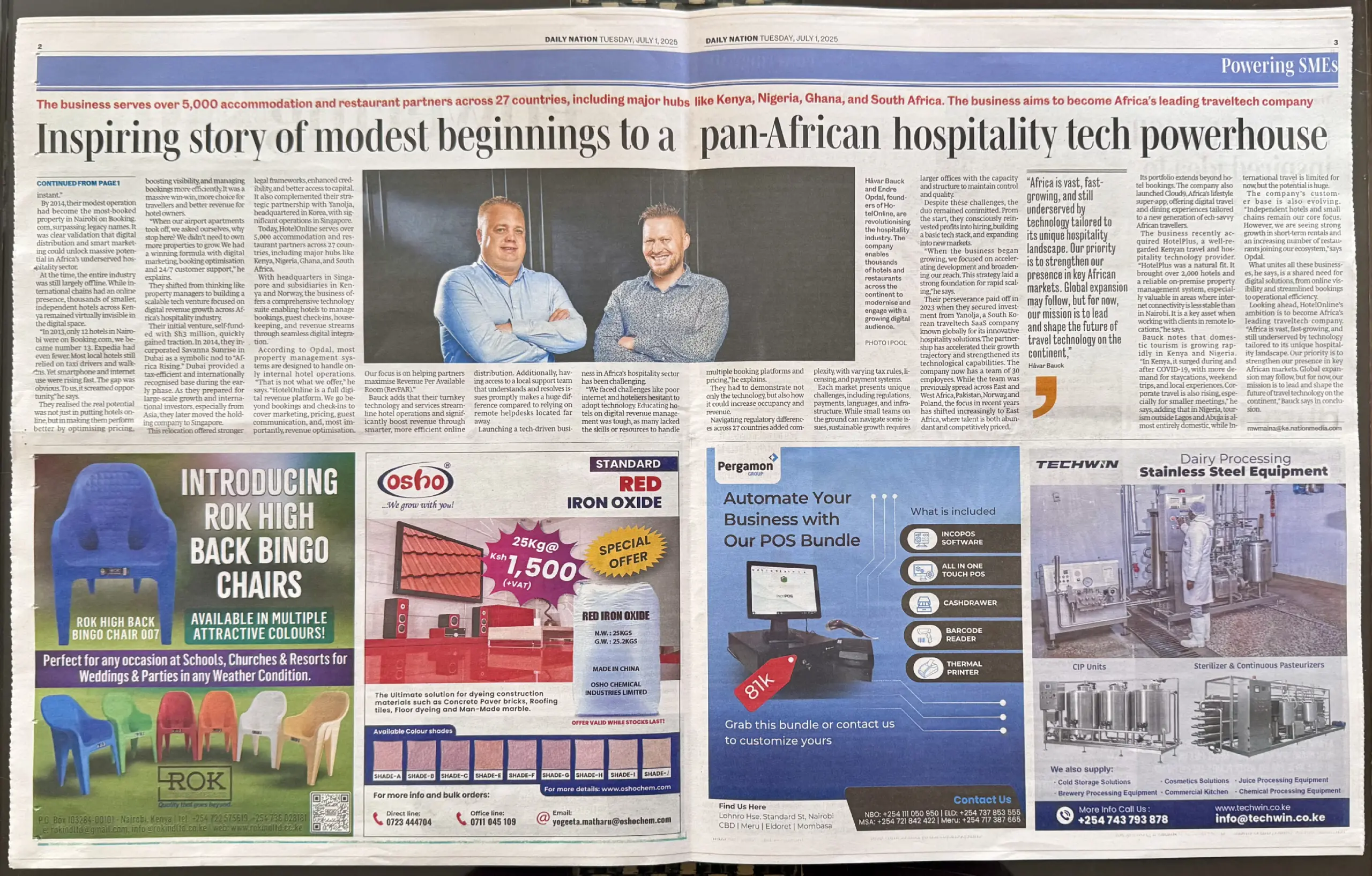

Published in Daily Nation (print edition) 2025-07-01
From modest beginnings to a pan-African hospitality tech powerhouse.
BY MARGARET MAINA
Long before short-term rentals dotted every corner of the nation and “Airbnb” became a household name in Kenya, two Norwegian college friends, Håvar Bauck and Endre Opdal, found themselves reunited, not in Oslo, but in a quiet neighbourhood near Nairobi’s airport.
What began as a few casual conversations between neighbours would soon spark a digital revolution in African hospitality.
The duo, driven by a shared passion for travel and innovation, quickly saw both the challenges and the untapped opportunities within the region’s hospitality sector.
Frequent late-night discussions gave rise to a bold ambition on how to revolutionise how hotels in Africa operate and connect with travellers.
They identified a glaring gap in the market for affordable, online-bookable stays near Jomo Kenyatta International Airport (JKIA).
Despite the airport’s role as a major regional hub, nearby accommodation options were scarce, mostly high-end hotels that were expensive and often difficult to reach due to Nairobi’s infamous traffic.
“With limited resources, we leased and furnished five modest apartments in Syokimau, just minutes from the airport. Branded as the ‘Nairobi Airport Hotel,’ we listed the units on Booking.com and Expedia,” says Bauck, adding that they targeted transit passengers and short-stay travellers and offered free airport transfers, a novel idea at the time.
Their project would grow into HotelOnline, a pan-African tech company and leading digital revenue partner for the hospitality industry, helping thousands of hotels and restaurants across the continent modernise, thrive, and connect with a growing digital audience.
The company empowers properties across the continent to harness technology, compete in a rapidly digitising travel market, and has played a key role in ushering in Kenya’s short-stay, online-first accommodation era.
“We were pioneers,” he recalls. “Back then, the only hotels online in Nairobi were the big international five-star brands. Our apartments filled an entirely new niche, and the response was instant.”
That instinct proved right. By 2014, their modest operation had become the most-booked property in Nairobi on Booking.com, surpassing legacy names. It was clear validation that digital distribution and smart marketing could unlock massive potential in Africa’s underserved hospitality sector.
At the time, the entire industry was still largely offline. While international chains had an online presence, thousands of smaller, independent hotels across Kenya remained virtually invisible in the digital space.
In 2013, only 12 hotels in Nairobi were on Booking.com, we became number 13. Expedia had even fewer. Most local hotels still relied on taxi drivers and walk-ins. Yet smartphone and internet use were rising fast. The gap was obvious. To us, it screamed opportunity,” he says.
They realised the real potential was not just in putting hotels online, but in making them perform better by optimising pricing, boosting visibility, and managing bookings more efficiently. It was a massive win-win, more choice for travellers and better revenue for hotel owners.
“When our airport apartments took off, we asked ourselves, why stop here? We didn’t need to own more properties to grow. We had a winning formula with digital marketing, booking optimisation and 24/7 customer support,” he explains.
They shifted from thinking like property managers to building a scalable tech venture focused on digital revenue growth across Africa’s hospitality industry.
Their initial venture, self-funded with Sh3 million, quickly gained traction.
In 2014, they incorporated Savanna Sunrise in Dubai as a symbolic nod to “Africa Rising.” Dubai provided a tax-efficient and internationally recognised base during the early phase. As they prepared for large-scale growth and international investors, especially from Asia, they later moved the holding company to Singapore.
This relocation offered stronger legal frameworks, enhanced credibility, and better access to capital. It also complemented their strategic partnership with Yanolja, headquartered in Korea, with significant operations in Singapore.
Today, HotelOnline serves over 5,000 accommodation and restaurant partners across 27 countries, including major hubs like Kenya, Nigeria, Ghana, and South Africa.
With headquarters in Singapore and subsidiaries in Kenya and Norway, HotelOnline offers a comprehensive technology suite enabling hotels to manage bookings, guest check-ins, housekeeping, and revenue streams through seamless digital integration.
According to Opdal, most property management systems are designed to handle only internal hotel operations.
“That is not what we offer,” he says. “HotelOnline is a full digital revenue platform. We go beyond bookings and check-ins to cover marketing, pricing, guest communication, and, most importantly, revenue optimisation. Our focus is on helping partners maximise Revenue Per Available Room (RevPAR).”
Bauck adds that their turnkey technology and services streamline hotel operations and significantly boost revenue through smarter, more efficient online distribution.
Additionally, having access to a local support team that understands and resolves issues promptly makes a huge difference compared to relying on remote helpdesks located far away.
Launching a tech-driven business in Africa’s hospitality sector has been challenging.
“We faced challenges like poor internet and hoteliers hesitant to adopt technology. Educating hotels on digital revenue management was tough, as many lacked the skills or resources to handle multiple booking platforms and pricing,” he explains.
They had to demonstrate not only the technology but also how it could increase occupancy and revenue.
Navigating regulatory differences across 27 countries added complexity, with varying tax rules, licensing, and payment systems.
Each market presents unique challenges, including regulations, payments, languages, and infrastructure. While small teams on the ground can navigate some issues, sustainable growth requires larger offices with the capacity and structure to maintain control and quality.
Despite these challenges, the duo remained committed. From the start, they consciously reinvested profits into hiring, building a basic tech stack, and expanding into new markets.
“When the business began growing, we focused on accelerating development and broadening our reach. This strategy laid a strong foundation for rapid scaling,” he says.
Their perseverance paid off in 2023 when they secured investment from Yanolja, a South Korean traveltech SaaS company known globally for its innovative hospitality solutions. The partnership has accelerated HotelOnline’s growth trajectory and strengthened its technological capabilities.
The company now has a team of 30 employees. While the team was previously spread across East and West Africa, Pakistan, Norway, and Poland, the focus in recent years has shifted increasingly to East Africa, where talent is both abundant and competitively priced.
Its portfolio extends beyond hotel bookings. The company also launched Cloud9, Africa’s lifestyle super-app, offering digital travel and dining experiences tailored to a new generation of tech-savvy African travellers.
HotelOnline recently acquired HotelPlus, a well-regarded Kenyan travel and hospitality technology provider.
“HotelPlus was a natural fit. It brought over 2,000 hotels and a reliable on-premise property management system, especially valuable in areas where internet connectivity is less stable than in Nairobi. It is a key asset when working with clients in remote locations,” he says.
Bauck notes that domestic tourism is growing rapidly in Kenya and Nigeria.
“In Kenya, it surged during and after COVID-19, with more demand for staycations, weekend trips, and local experiences. Corporate travel is also rising, especially for smaller meetings,” he says, adding that in Nigeria, tourism outside Lagos and Abuja is almost entirely domestic, while International travel is limited for now, but the potential is huge.
The company’s customer base is also evolving.
“Independent hotels and small chains remain our core focus. However, we are seeing strong growth in short-term rentals and an increasing number of restaurants joining our ecosystem,” says Opdal.
What unites all these businesses, he says, is a shared need for digital solutions, from online visibility and streamlined bookings to operational efficiency.
Looking ahead, HotelOnline’s ambition is to become Africa’s leading traveltech company.
“Africa is vast, fast-growing, and still underserved by technology tailored to its unique hospitality landscape. Our priority is to strengthen our presence in key African markets. Global expansion may follow, but for now, our mission is to lead and shape the future of travel technology on the continent,” Bauck says in conclusion.
